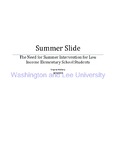Summer Slide: The Need for Summer Intervention for Low Income Elementary School Students

View/
Author
McGarry, Mary V.
Subject
Washington and Lee University, Shepherd Poverty Program
Early childhood education
Year-round schools
Literacy programs
Metadata
Show full item recordDescription
Mary V. McGarry is a member of the Class of 2014 of Washington and Lee University. Capstone; [FULL-TEXT FREELY AVAILABLE ONLINE] Much of the literature and policies aimed at elementary education focus on making improvements to the calendar school year; however, one of the most important areas of elementary education reform to consider is the loss of knowledge during the summer vacation months. This issue has a significant impact on the start of the next school year as many teachers are faced with a class that has fallen behind and must spend a few weeks reviewing material from the previous year. Some students never overcome the summer achievement gap, leaving them to fall increasingly further behind. The students most vulnerable are low income students, as the summer effect “exacerbates the well-documented achievement gap between economically advantaged and disadvantaged students.”1 Policy makers need to understand that the summer break is a crucial window of time in which to implement policies aimed at closing the achievement gap. Summer programs have the potential to ensure that students begin the next school year ready to learn new material, and could make a significant impact on underprivileged students' achievement in school. [From the Introduction to the Issue] Virginia McGarry